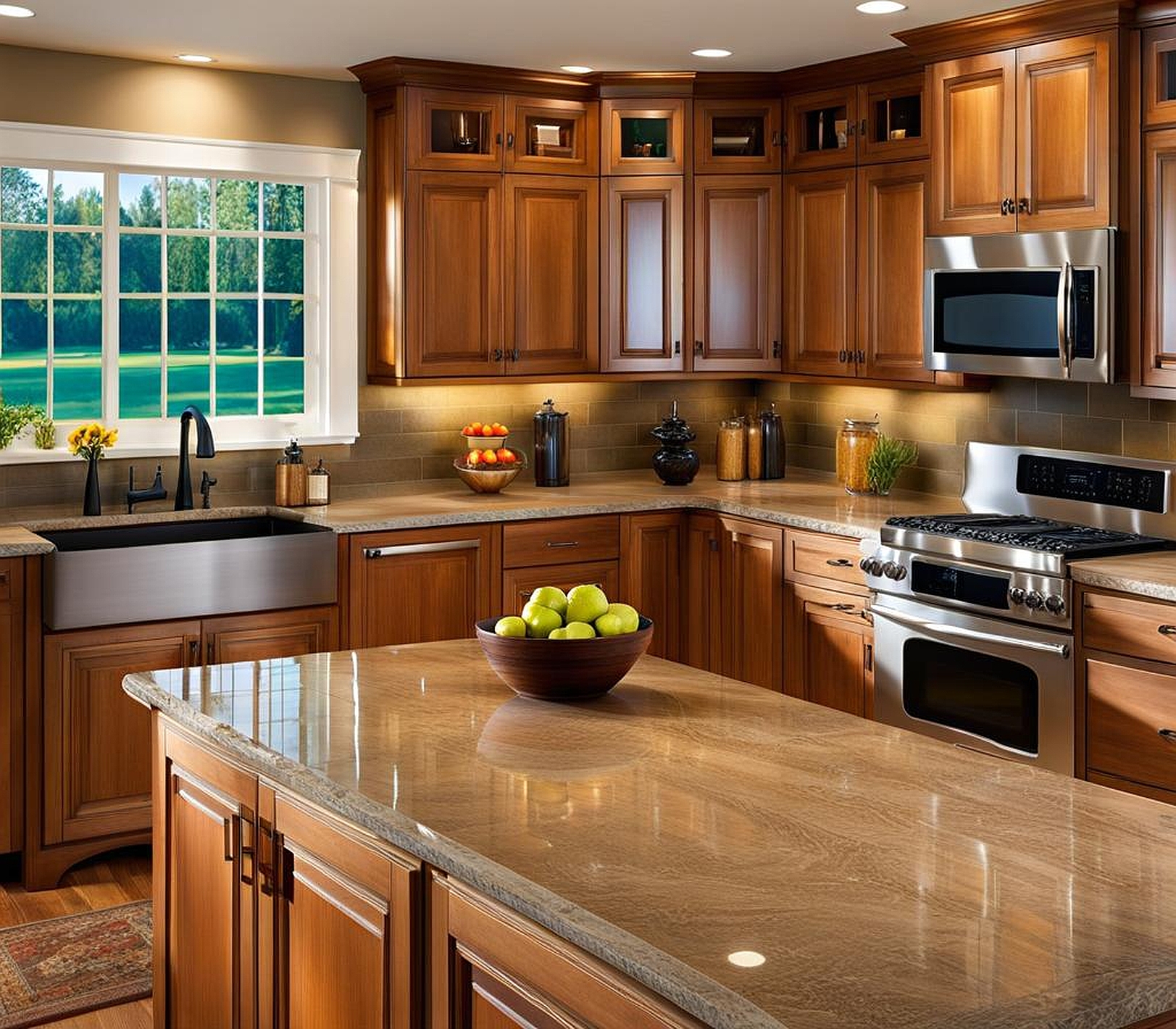The perfect countertop can accentuate the warmth and charm of the cabinets, and it requires a harmonious blend of elements. Imagine a space where rich, natural tones intermingle seamlessly, creating an inviting ambiance that embraces both functionality and aesthetic delight.
Timeless Beauty: Exploring Popular Countertop Choices
When it comes to selecting countertops for hickory cabinets, the options are plentiful, each offering its unique allure. Granite, with its captivating patterns and durability, lends an air of sophistication to any kitchen. Quartz, on the other hand, is a low-maintenance marvel that boasts a vast array of colors and designs, ensuring a perfect match for your hickory cabinetry.
For those seeking a more rustic charm, butcher block countertops are a delightful choice. Their warm, organic appeal complements the hickory’s natural grain, creating a cozy and inviting atmosphere. Alternatively, soapstone’s deep, luxurious hues can add a touch of elegance, while its non-porous surface makes it a practical choice for busy kitchens.
Regardless of your preference, each countertop material offers its own unique advantages. Consider not only the aesthetic appeal but also the durability, maintenance requirements, and overall compatibility with your lifestyle. A knowledgeable professional can guide you through the selection process, ensuring a harmonious blend that elevates the beauty of your hickory cabinets.
Elevating Hickory Spaces with Complementary Countertops
Hickory cabinets exude a warm, inviting aura that can be further accentuated by the right countertop choice. When paired with lighter-toned countertops, such as beige or cream hues, the hickory’s rich tones become the focal point, creating a visually stunning contrast. This pairing can lend a sense of airiness and spaciousness to your kitchen, making it appear brighter and more open.

Conversely, for a more dramatic and bold statement, consider darker countertop options like black granite or honed black slate. These choices amplify the depth and warmth of the hickory, resulting in a luxurious and sophisticated ambiance. The depth of the countertop hue allows the intricate grain patterns of the wood to truly shine, captivating the eye and infusing the space with a sense of elegance.
| Countertop Material | Pros | Cons |
|---|---|---|
| Granite |
|
|
| Quartz |
|
|
Ultimately, the key lies in striking the perfect balance between the countertop and the hickory cabinets, ensuring that they complement each other seamlessly, creating a cohesive and visually appealing space that reflects your unique style and preferences.
Design Inspiration: Countertop Pairings for Hickory Cabinets
Let’s delve into some captivating design inspirations that showcase the harmonious interplay between hickory cabinets and their countertop counterparts:
- Hickory cabinets paired with honed black granite countertops exude a rich, luxurious feel, perfect for a contemporary or transitional kitchen.
- For a warm and rustic vibe, consider pairing hickory with butcher block countertops – their organic appeal creates a cozy, inviting atmosphere.
- White quartz countertops provide a crisp, clean contrast against the warm tones of hickory, lending a fresh and airy ambiance to your space.
- Embrace the natural beauty of both materials by combining hickory with earthy-toned travertine countertops, creating a harmonious blend of textures and hues.
- For a touch of elegance, pair hickory cabinets with sleek, dark soapstone countertops, allowing the intricate wood grains to take center stage.
Remember, the key to a successful design lies in understanding your personal style and the overall aesthetic you wish to achieve. Don’t be afraid to experiment and consult with design professionals to discover the perfect countertop pairing that will elevate the beauty of your hickory cabinets, transforming your kitchen into a stunning and inviting haven.
Practical Considerations: Maintenance and Durability
While aesthetics play a crucial role in selecting the ideal countertop for your hickory cabinets, it’s equally important to consider practical aspects like maintenance and durability. Each countertop material requires specific care routines to maintain its luster and longevity. For instance, granite and quartz are known for their low-maintenance qualities, while butcher block demands regular oiling and sealing to prevent staining and warping.
Moreover, the level of activity in your kitchen should influence your choice. High-traffic areas may benefit from more durable options like granite or quartz, which can withstand the wear and tear of daily use. On the other hand, if your kitchen is primarily used for light cooking and entertaining, you may have more flexibility to explore softer materials like soapstone or butcher block.
It’s also wise to consider the overall investment involved. While some countertop materials may come with a higher initial cost, they might prove more cost-effective in the long run due to their durability and low maintenance requirements. Consulting with professionals can help you strike the right balance between your desired aesthetic, practical needs, and budget constraints.
When it comes to designing your dream kitchen, personal style should take center stage. While selecting the perfect countertop for your hickory cabinets is a significant consideration, don’t be afraid to add creative touches that reflect your unique personality and taste.
For instance, consider introducing accent materials like glass, metal, or tile to create a stunning backsplash or an eye-catching island countertop. These elements can add depth and interest to your space while complementing the warmth of your hickory cabinets and chosen countertop material.
Additionally, hardware and lighting fixtures can play a crucial role in tying the entire design together. Opt for brushed or matte finishes that harmonize with the natural tones of hickory, or embrace the warmth with copper or brass accents. Strategically placed lighting can also highlight the intricate details of your cabinetry and countertops, creating a truly inviting and sophisticated ambiance.
Ultimately, the key to achieving a stunning and harmonious kitchen lies in the intricate balance of elements, where each component seamlessly complements the others, resulting in a space that reflects your personal style while embodying both form and function.